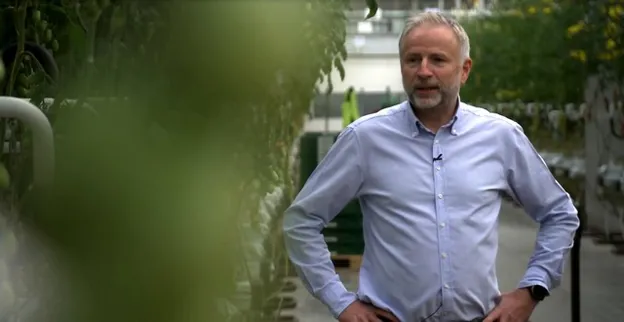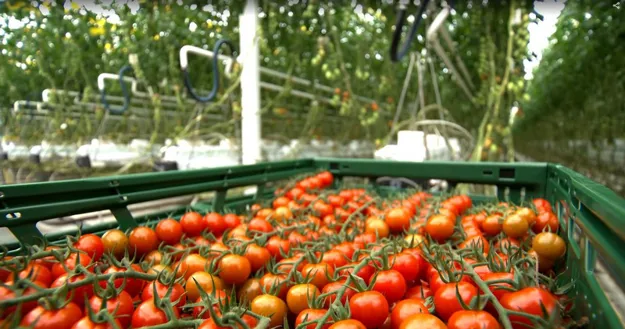"The price of gas has risen by 750 percent and electricity prices have doubled," says Mads Ulrik Pedersen with Danish greenhouse company Alfred Pedersen & Son. He explains how this means that winter production of Danish tomatoes has been reduced by 40%. "We have had to lay off 30 of our skilled employees. We are, of course, sorry, and we hope that the Danes will continue to prefer environmentally friendly, safely grown, and clean Danish greenhouse vegetables," he says.

Gas and electricity prices are affecting the greenhouse industry in many Northern European countries. The situation in Denmark is no different. "We have experienced price fluctuations before, but what is unusual here is that we are going from low prices in both the electricity and gas markets to historically high prices, and it has happened extremely fast," says Lars Aagaard, CEO with Danish Energy to the Danish news agency tv2fyn.dk.
The consequences can also be felt in the greenhouse of Alfred Pedersen & Son, just south of Odense, Denmark. Some of their tomato greenhouses are currently empty and will remain so until the traditional, unlighted season starts in February. The company has cut their production of winter tomatoes by 40 percent and laid off 30 employees out of their workforce of 300 – something they did not do lightheartedly, as finding good people is challenging as well.
"The sole reason is the high energy prices we have experienced in the last six months,” says Mads Ulrik Pedersen, adding that gas prices have risen by 750 percent and electricity prices have doubled. "It's the perfect storm. The rising costs have made our customers afraid that the sales in the shops will decrease, which is why they've cut back on their orders and we've cut back on our production," he explains, adding that they only grow tomatoes that are already sold via contracts. “We haven’t grown for the open market for many years, as we do not gamble on prices. If we can’t get the price we need, we simply do not sow it.”

25% of the energy contracts at Alfred Pedersen & Son were fixed. "Unfortunately, we have not fixed much, so right now, it's really bad. On the other hand, it's been extremely good for a really long time,” says Mads Ulrik Pedersen. The company invested in LED lights several years ago. Although this means there is no heat coming from their lamps, he is still convinced of this choice. “Today, it’s only a little bit better, but in the long run, it’s much better.” For the moment, they adjust their lighting strategy to the electricity prices. “We fixed some of our electricity prices, but not all of it. When the electricity price is high, we turn the lights down.”
It is all a matter of mathematics, Mads Ulrik Pedersen confirms: how much can the plant handle, what are the electricity costs, what does the market pay? “Times are crazy. These energy prices pop up every now and then, but only for an hour or two. This situation is completely different from anything we’ve experienced in the past.” He points out how the situation does not affect just vegetable growers
To tv2fyn.dk, Lars Aagaard with Danish Energy says it is difficult to predict how energy prices will develop in the near future, "but the market suggests that prices will remain high until the heating season is over." He adds this is not the year to hope for a white Christmas. "Energy prices will be very dependent on the weather in the coming months. If we have a cold, windless winter in Russia, Germany, France, and the Nordic countries, energy demand will increase significantly, which will push up natural gas prices even further. If, on the other hand, we have a mild, windy, and rainy winter, the Norwegians will have hydro power and we will have wind power. Then prices will fall again."
Price increase for the consumer?
With fewer vegetables in the greenhouses and rising costs, Mads Ulrik Pedersen predicts that a tray of tomatoes in the supermarket will rise from around DKK 15 to DKK 18 - from approximately €2 to €2,40.
At retailer COOP, communications and analysis manager Lars Aarup does not expect the bill for rising electricity prices to land with consumers. "Right now, we are in the process of making annual contracts with suppliers. The supermarket's task here is to keep prices in check so that consumers feel the impact as little as possible. There might be price increases, but I don't expect it to be more than 1-2 kroner," says Lars Aarup.
For now, the company hopes to find support among the Danish consumers. Danish consumers have a strong preference for local produced vegetables, although there is also a lot of products being imported. “Spain will have a good winter and spring, that’s for sure,” Mads Ulrik Pedersen says. “We’re hoping the situation will go back to normal next year. For now, we have to get better prices to make up for the higher costs. Hopefully, we will not fight each other off of the market: everybody will suffer this winter, and we need a good price to make up for the losses of 2021 and 2022. If not, a lot of growers will suffer hard.”
For more information:
Alfred Pedersen & Søn ApS
Assensvej 217 - 5250 Odense SV
[email protected]
www.tomater.dk
